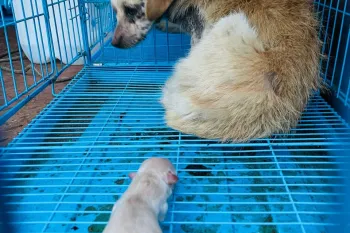BEIJING—Ahead of the Yulin dog meat ‘festival’ in south China beginning on 20 June to coincide with the summer solstice, a new consumer survey in the city shows that a super majority of Yulin residents (87.5%) never or rarely eat dog or cat meat and 88% say a ban on the dog and cat meat trade would have no impact on their lives at all. The survey is also released alongside new photos and video of dog and cat meat stalls in Yulin as well as stalls selling live animals for meat in Beiliu, which is a neighboring city in the southeast of Guangxi and is under the administration of Yulin.
The trafficking and brutal slaughter of thousands of dogs and cats for meat is due to ramp up in the weeks leading up to the Yulin event. Most of these animals are stolen pets or strays grabbed from the streets and backyards across China using catch poles or food and darts baited with poison. They are crammed into cages and loaded onto trucks for gruelling journeys that last for hours or days without food, water or rest.
The survey was conducted via face to face interviews with the Yulin residents by Vshine, the Chinese partner group of Humane World for Animals which campaigns globally to end Asia’s dog and cat meat trade. The organizations will submit the survey results to the Yulin government to demonstrate that the city’s dog and cat meat trade is not actively supported by most residents.
Dr Peter Li, China policy expert advising Humane World for Animals, said: “Despite Yulin’s reputation for being a dog and cat meat hotspot, this new survey reveals that most Yulin residents don’t in fact eat dog or cat meat nor feel a ban would impact their daily lives. While meat traders perpetuate the fallacy that dog and cat meat is tradition, they clearly don’t represent the majority of Yulin residents. We hope the survey will encourage Yulin authorities to crack down on the brutal trafficking and slaughter of dogs and cats in Yulin, consistent with national policy that dogs and cats are companions not for consumption. It would also follow the One Health principle by eliminating a trade that jeopardizes China’s anti-rabies efforts with the mass unregulated cross-country movement of dogs and cats of unknown disease and vaccination status. China’s dog and cat slaughter misery must end.”
Survey results summary:
- The majority of Yulin residents surveyed (87.5%) never or rarely eat dog or cat meat (once or several times a year). Relatively few people (12.5%) eat it regularly (at least once per week or month).
- 88% of respondents said their dog/cat meat consumption had decreased in the last few years.
- 88% of respondents said a dog/cat meat trade ban in Yulin would have no impact on their lives at all. Only one person surveyed said such a ban would have a great impact.
Xiaorui Cheng*, a local Yulin activist, said: “While most dog meat restaurants in Yulin appeared relatively lifeless and rundown, we saw stalls at Dongkou and Nanqiao meat markets piled high with dog and cat carcasses. The sound of vendors’ meat cleavers continuously chopping bits of dead dog or cat resonated throughout the market and was hard to bear. We also saw live dogs for sale on the outskirts of Yulin. Many were small breeds more likely to be stolen pets, some still wearing collars. As a Chinese person, it’s frustrating that Yulin has become notorious around the world for this gruesome trade that clearly doesn’t represent the majority of its residents and does such damage to our country’s international reputation.”
An estimated 10 million dogs and 4 million cats are killed annually for the meat trade across China. While the slaughter of dogs and cats in Yulin represents a fraction of that year-round, nationwide trade, several thousand dogs and cats will be killed in Yulin during the festival days alone. Over the years, the Yulin authorities have attempted several crack downs including roadblocks to stop trucks entering the city packed with dogs and cats. In 2020 the two major cities of Shenzhen and Zhuhai successfully implemented bans on the consumption of dog and cat meat, and China’s Ministry of Agriculture and Rural Affairs made an official statement that dogs are companion animals and not “livestock” for eating. Despite this progress, the authorities in Yulin have not implemented robust measures to ban the trade, even though the supply of dogs and cats relies primarily on criminal activity.
The Yulin “festival” is not a traditional event. It was launched in 2010 by dog meat traders to encourage dog meat eating and boost sales. Prior to 2010, Yulin had no history of commercial dog or cat meat sales.
Most people across China don’t eat dogs and cats. Dog meat bans exist in Hong Kong, Taiwan, Thailand, Singapore and the Philippines, as well as in the cities of Shenzhen and Zhuhai in mainland China, Siem Reap province in Cambodia and 88 cities and jurisdictions in Indonesia. Most recently in 2024 the dog meat industry was banned in South Korea, effective from 2027 following significant local opposition to the industry.
#
*Not their real name
Notes: All figures are based on face- to-face interviews conducted by Vshine in central, suburban and rural Yulin. Total sample size was 160 adults. The survey was carried out between March 22–26 2025. The face-to-face interviews were conducted in eight agricultural markets in and outside Yulin, more than 50 dog meat restaurants in Yulin, more than 60 dog meat stalls and four live dog slaughterhouses in Yulin as well as bus stations, parks and village squares in and just outside Yulin.
